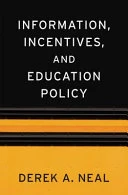Information, Incentives, and Education Policy

Blurb
Derek Neal writes that economists must analyze public education policy in the same way they analyze other procurement problems. He shows how standard tools from economics research speak directly to issues in education. For mastering the models and tools that economists of education should use in their work, there is no better resource available.
Book summary
How do we ensure that waste and inefficiency do not undermine the mission of publicly funded schools? Derek Neal writes that economists must analyze education policy in the same way they analyze other procurement problems. Insights from research on incentives and contracts in the private sector point to new approaches that could induce publicly funded educators to provide excellent education, even though taxpayers and parents cannot monitor what happens in the classroom. Information, Incentives, and Education Policy introduces readers to what economists know—and do not know—about the logjams created by misinformation and disincentives in education. Examining a range of policy agendas, from assessment-based accountability and centralized school assignments to charter schools and voucher systems, Neal demonstrates where these programs have been successful, where they have failed, and why. The details clearly matter: there is no quick-and-easy fix for education policy. By combining elements from various approaches, economists can help policy makers design optimal reforms. Information, Incentives, and Education Policy is organized to show readers how standard tools from economics research on information and incentives speak directly to some of the most crucial issues in education today. In addition to providing an overview of the pluses and minuses of particular programs, each chapter includes a series of exercises that allow students of economics to work through the mathematics for themselves or with an instructor’s assistance. For those who wish to master the models and tools that economists of education should use in their work, there is no better resource available.

